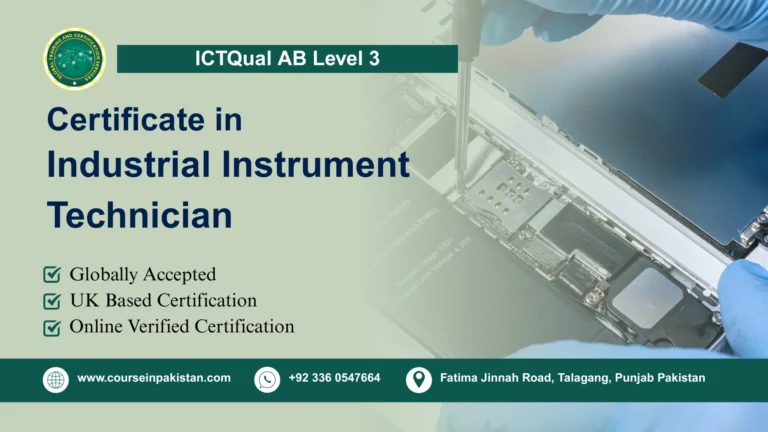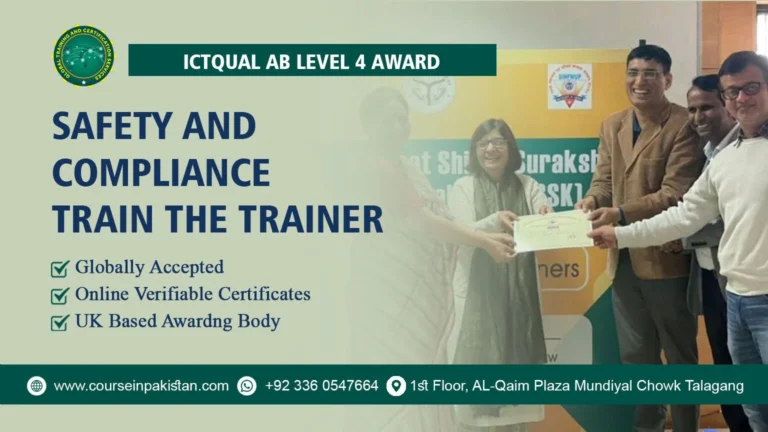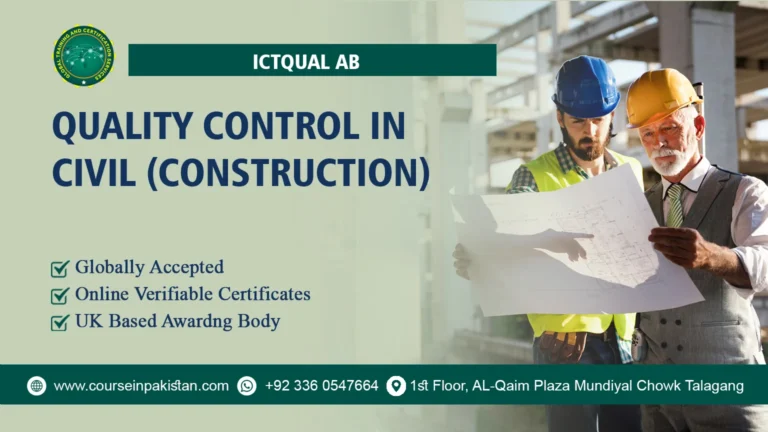This diploma emphasizes the integration of theory with real-world application through case studies, simulation tools, and practical exercises. Graduates will be capable of overseeing refinery operations, improving process efficiency, managing risks, and leading teams in industrial environments. The program equips learners with both technical and managerial competencies, making them valuable professionals for multinational oil and gas companies, energy consultancies, and industrial facilities.
The ICTQual AB Level 6 International Diploma in Refinery Operations is designed to provide learners with advanced knowledge and practical skills required for efficient and safe operation of petroleum refineries. This program covers refinery process technology, plant operations, safety management, and environmental compliance, preparing students to handle complex refinery systems and optimize production. Learners will gain expertise in processing crude oil, managing refinery equipment, and implementing quality control measures, ensuring operational excellence in a highly regulated industry.
Course Overview
The ICTQual AB Level 6 International Diploma in Refinery Operations is a globally recognized qualification designed to equip learners with advanced knowledge and practical skills in refinery processes, petroleum production, safety management, and operational efficiency. This 360-credit, fully assignment-based diploma allows learners to study at their own pace from anywhere in the world. It is British Council verificable and MOFA and Embassy attestable, making it highly suitable for employment, career advancement, and iqama approval. The course covers essential topics such as crude oil processing, distillation, refining technologies, quality control, environmental compliance, and operational management, preparing learners to manage refinery operations effectively and safely.
This qualification is suitable for both fresh learners and experienced professionals. Fresh students are required to complete all 36 mandatory assignments within three years, while experienced and competent individuals with at least six years of relevant experience can complete the certification in a shorter time by submitting verifiable experience and defending their knowledge in professional discussion meetings with an ICTQual AB approved assessor, without completing all mandatory assignments. By the end of the program, learners will have developed the technical expertise, operational management skills, and strategic capabilities required to take on senior roles in refinery operations, petroleum processing, and energy sector management, ensuring career growth and professional recognition both locally and internationally.
Key Highlights of the Course:
- Advanced training in refinery processes, operations, and management
- Practical experience in safety, quality control, and environmental compliance
- Focus on optimizing refinery efficiency and process performance
- Preparation for leadership roles in refinery and petrochemical operations
- Globally recognized qualification aligned with industry standard
Course Benefits
Develop Expertise in Refinery Operations
- Gain in-depth knowledge of crude oil processing, refining techniques, and plant operations
- Learn to manage refinery systems efficiently while maintaining product quality
Enhance Technical and Analytical Skills
- Master process monitoring, troubleshooting, and operational optimization
- Apply data analysis and simulation tools for performance improvement
Expand Career Opportunities
- Prepare for roles such as Refinery Operator, Process Engineer, Plant Supervisor, or Operations Manager
- Increase employability in national and international petroleum and energy companies
Leadership and Strategic Skills
- Develop team management, problem-solving, and decision-making abilities
- Learn to lead projects, ensure compliance, and implement best practices in refinery operations
Course Study Units
This qualification, the ICTQual AB Level 6 International Diploma in Refinery Operations, consists of 36 mandatory units.
Year 1 – Foundation in Refinery Operations
- Principles of Chemical Engineering
- Introduction to Petroleum Refining
- Crude Oil Properties and Analysis
- Refinery Process Units Overview
- Distillation Principles and Applications
- Heat and Mass Transfer in Refining
- Introduction to Catalysts and Chemical Reactions
- Process Instrumentation and Control Basics
- Health, Safety, and Environmental Awareness
- Industrial Laboratory Techniques
- Technical Report Writing
- Introduction to Process Simulation Software
Year 2 – Intermediate Refinery Operations
- Advanced Distillation and Separation Techniques
- Hydrocracking and Hydrotreating Processes
- Fluid Catalytic Cracking (FCC) Operations
- Process Control and Automation in Refineries
- Energy Management and Efficiency in Refining
- Reactor Design and Optimisation
- Process Safety Management
- Refinery Production Planning
- Quality Control and Assurance in Refining
- Environmental Management and Sustainability
- Petroleum Product Blending Techniques
- Data Analysis and Technical Communication
Year 3 – Advanced Refinery Operations
- Advanced Process Optimisation and Troubleshooting
- Refinery Project Management
- Catalysts and Reaction Kinetics in Depth
- Advanced Process Simulation and Modelling
- Corrosion and Maintenance in Refineries
- Energy Transition and Cleaner Refining Technologies
- Risk Assessment and Hazard Analysis
- Advanced Laboratory Techniques and Process Testing
- Supply Chain and Logistics in Refining
- Capstone Project in Refinery Operations
- Professional Development and Leadership in Energy
- Strategic Decision-Making in Refinery Management
Learning Outcomes
Year 1 – Foundation in Refinery Operations
Principles of Chemical Engineering
- Understand core chemical engineering concepts applicable to refinery processes
- Apply principles of mass and energy balance in basic refining operations
Introduction to Petroleum Refining
- Comprehend the key stages and functions of petroleum refining
- Evaluate different refinery process units and their interconnections
Crude Oil Properties and Analysis
- Analyze physical and chemical properties of crude oil
- Assess the impact of crude characteristics on refining processes
Refinery Process Units Overview
- Identify and describe the function of major refinery process units
- Understand workflow and integration across the refinery
Distillation Principles and Applications
- Apply distillation theory to crude oil separation processes
- Design basic distillation schemes for hydrocarbon fractions
Heat and Mass Transfer in Refining
- Understand heat and mass transfer principles in process operations
- Apply transfer principles to optimize refinery unit operations
Introduction to Catalysts and Chemical Reactions
- Understand the role of catalysts in refinery reactions
- Apply chemical reaction principles to refining processes
Process Instrumentation and Control Basics
- Learn fundamentals of process control and instrumentation
- Monitor and regulate refinery process parameters
Health, Safety, and Environmental Awareness
- Apply safety procedures and environmental regulations in refinery settings
- Identify hazards and implement risk mitigation strategies
Industrial Laboratory Techniques
- Conduct laboratory experiments relevant to refining processes
- Analyze and interpret experimental data to support process decisions
Technical Report Writing
- Prepare structured, clear, and professional technical reports
- Communicate findings effectively to stakeholders
Introduction to Process Simulation Software
- Use simulation software for modeling refinery processes
- Analyze results to improve operational efficiency
Year 2 – Intermediate Refinery Operations
Advanced Distillation and Separation Techniques
- Design and optimize distillation and separation processes
- Evaluate performance of separation units under varying conditions
Hydrocracking and Hydrotreating Processes
- Understand hydrocracking and hydrotreating operations
- Apply process knowledge to improve yield and product quality
Fluid Catalytic Cracking (FCC) Operations
- Comprehend FCC unit design and operation
- Optimize FCC processes to enhance product output
Process Control and Automation in Refineries
- Apply advanced process control strategies
- Integrate automation for efficient refinery operations
Energy Management and Efficiency in Refining
- Implement energy-saving techniques in refinery processes
- Analyze energy consumption for optimization opportunities
Reactor Design and Optimisation
- Understand reactor design principles and kinetics
- Apply optimization techniques to improve chemical reactions
Process Safety Management
- Conduct process hazard analyses and safety audits
- Implement safety management systems in refinery operations
Refinery Production Planning
- Develop and execute production schedules
- Optimize refinery throughput and product output
Quality Control and Assurance in Refining
- Monitor refinery products for compliance with standards
- Implement quality assurance procedures
Environmental Management and Sustainability
- Apply environmental management practices in refining
- Integrate sustainable and cleaner technologies in operations
Petroleum Product Blending Techniques
- Understand blending processes for petroleum products
- Optimize blending for quality, performance, and compliance
Data Analysis and Technical Communication
- Analyze process and production data for decision-making
- Communicate technical insights effectively to management and teams
Year 3 – Advanced Refinery Operations
Advanced Process Optimisation and Troubleshooting
- Diagnose process issues and implement corrective actions
- Optimize operational efficiency and product yield
Refinery Project Management
- Plan, execute, and manage refinery projects
- Apply project management principles to ensure timely and cost-effective delivery
Catalysts and Reaction Kinetics in Depth
- Understand advanced catalyst behavior and reaction kinetics
- Apply kinetics knowledge to enhance refining operations
Advanced Process Simulation and Modelling
- Use sophisticated simulation tools for process modeling
- Predict process behavior and optimize refinery operations
Corrosion and Maintenance in Refineries
- Understand corrosion mechanisms and maintenance strategies
- Implement preventive maintenance programs for refinery equipment
Energy Transition and Cleaner Refining Technologies
- Integrate cleaner technologies for sustainable refining
- Adapt refinery operations to global energy transition trends
Risk Assessment and Hazard Analysis
- Conduct detailed risk assessments and hazard analyses
- Develop mitigation plans to ensure safe refinery operations
Advanced Laboratory Techniques and Process Testing
- Conduct advanced laboratory experiments to evaluate refinery processes
- Interpret data to support operational decisions and innovations
Supply Chain and Logistics in Refining
- Manage refinery supply chain and logistics effectively
- Optimize material and product flow within refinery operations
Capstone Project in Refinery Operations
- Apply knowledge and skills to complete a comprehensive project
- Provide actionable solutions to real-world refinery challenges
Professional Development and Leadership in Energy
- Develop leadership, communication, and professional skills
- Lead teams and projects in complex refinery environments
Strategic Decision-Making in Refinery Management
- Make informed strategic decisions to optimize refinery performance
- Integrate technical, financial, and environmental considerations into planning
Who is This Course For?
Aspiring Refinery Professionals
- Individuals seeking to build careers in petroleum refining, process operations, and plant management
- Learners aiming to understand and manage refinery systems efficiently
Industry Practitioners
- Professionals currently working in oil, gas, or petrochemical industries looking to upskill
- Individuals wanting to progress into operational, technical, or managerial roles
Engineering and Science Graduates
- Graduates in chemical engineering, mechanical engineering, petroleum engineering, or related disciplines
- Learners seeking internationally recognized qualifications to advance technical expertise
Analytical and Safety-Oriented Learners
- Individuals with strong analytical skills and an interest in process optimization
- Learners committed to implementing health, safety, and environmental standards in industrial operations
Future Progression
- Refinery Operations Engineer, Process Engineer, or Plant Supervisor
- Operations Manager or Technical Lead in refinery and petrochemical facilities
- Project Manager for refinery optimization or expansion projects
- Specialist roles in process safety, energy management, or quality assurance
- Pathways to postgraduate studies such as MSc in Chemical Engineering, Petroleum Engineering, or Process Management
Academic Pathways:
- Master’s programs in Refinery Operations, Chemical Engineering, or Energy Management
- Postgraduate diplomas in Engineering, Process Safety, or Industrial Operations
- Professional certifications in refinery simulation, process control, or advanced plant operations
- Specialized courses in energy transition, sustainable refining, or advanced petrochemical processes
Conclusion
The ICTQual AB Level 6 International Diploma in Refinery Operations equips learners with the technical, operational, and managerial skills required to excel in the global petroleum refining industry. Graduates gain expertise in process optimization, safety management, and strategic decision-making, enabling them to lead teams, manage complex projects, and implement innovative solutions in refinery operations. This qualification provides a strong foundation for career advancement, leadership roles, and further academic study in energy, chemical, and process engineering disciplines.






